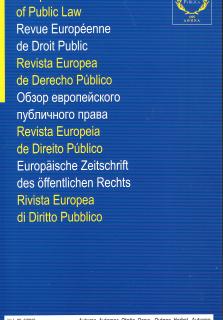
Un double Équilibre
pour l’organisation juridictionnelle;
Les rÔles de la constitution et de la CEDH
dans le cadre de la concrÉtisation des principes
relatifs À l’organisation juridictionnelle
aux pays-bas, en france et en Allemagne
(A Double Balance in the Judicial Organisation;
The Roles of the Constitution and of the ECHR
within the Framework of Implementing the Principles
relating to the Judicial Organisation
in the Netherlands, France and Germany)
Universitair hoofddocent (maître de conférences) à l’Université Erasmus de Rotterdam
How can we balance principles for judicial organisation in an era when principles of “classical rule of law”, such as independence and impartiality of justice, must be made compatible with the exigencies of the “new public management”, aiming at the efficiency of justice? A comparative analysis of the Dutch, French and German legal systems proves, firstly, that the balancing of principles concerning judicial organisation is taking place in the context of the development of a new paradigm that integrates classical principles and modern principles in a new concept of “quality” of justice. Secondly, the analysis shows that the balancing of principles in the framework of these legal systems is conditioned by the constitutional adjustment of principles, and in particular by the “flexibility” of the constitutional framework for expressing normative changes. Within that framework, the interaction between constitutional norms and conventional norms, and in particular Article 6 § 1 ECHR, has an important incidence. Reciprocal inspiration of national legal systems and the ECHR proves to be a leading factor in the concretisation of principles related to the judicial organisation, also a factor that permits a constant re-evaluation of the balance of principles.
Comment trouver un équilibre des principes pour l’organisation juridictionnelle à une époque où les principes de l’”Etat de droit classique”, tels que l’indépendance et l’impartialité de la justice, doivent être rendus compatibles aux exigences du “new public management”, visant l’efficacité de la justice? Une analyse comparative des systèmes juridiques néerlandais, français et allemand démontre, tout d’abord, que la mise en équilibre des principes relatifs à l’organisation juridictionnelle se déroule dans le contexte du développement d’un nouveau paradigme qui intègre les principes classiques et les principes modernes dans un nouveau concept de “qualité” de la justice. Dans un second temps, l’analyse révèle que la mise en équilibre des principes dans ces systèmes juridiques est conditionnée par l’aménagement constitutionnel des principes, et notamment par la “flexibilité” du cadre constitutionnel pour exprimer des changements normatifs. Dans ce cadre, l’interaction entre les normes constitutionnelles et les normes conventionnelles, plus particulièrement l’article 6 § 1 CEDH, a une incidence importante. L’inspiration réciproque des systèmes juridiques nationaux et de la CEDH s’avère être un facteur principal pour la concrétisation des principes relatifs à l’organisation juridictionnelle, un facteur aussi qui permet une réévaluation constante de l’équilibre des principes.





















